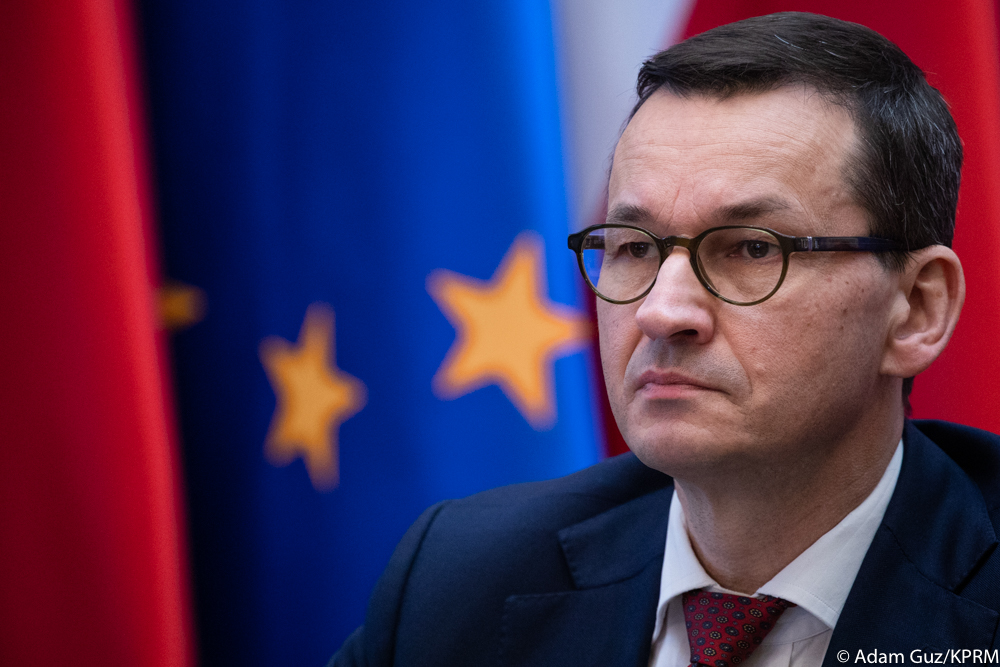Poland’s prime minister has warned, in an interview with a German newspaper, that the proposal to link European Union funds to the rule of law could have “fatal consequences for the union”.
He also hit out at western Europeans for failing to understand eastern members’ “difficult path” from communist rule, and warned against allowing the EU to become a Soviet-style system of “dependence, exploitation and neo-colonialism”.
Mateusz Morawiecki was speaking to Frankfurter Allgemeine Zeitung (FAZ), one of Germany’s leading dailies, about the current crisis triggered by Poland and Hungary’s refusal to approve the EU budget and coronavirus recovery fund due to a mechanism linking funds to the rule of law.
When asked why Poland and Hungary were prepared to put billions of euros and their relations with European partners at risk, the prime minister said that, in fact, people should ask why the European Commission and Parliament were seeking to “bypass fundamental principles of the European treaties”.
“This mechanism is supposed to protect the rule of law but is itself a fundamental breach of this,” warned Morawiecki. He said that the legal service of the European Council and the European Court of Auditors “have already determined [that] the mechanism creates the danger of legal uncertainty”.
“A wise law must be universal, not particular,” said the prime minister. “The present conditionality mechanism is just such particularism. It can be abused. With it, anyone is able to use it with fatal consequences for the EU. When this gate is open, it will never be able to be shut.”
“In order to emerge from this incomparable crisis [the pandemic] it would also be good to shelve ideologically motivated attacks on the sovereignty of single countries carried out under the cover of ‘conditionality’ and quickly move on to a development programme,” added Morawiecki.
“Our main concern is that this mechanism appears very arbitrary and can be applied with political motives,” he continued. “Today, if someone doesn’t like the Polish government, then they can pillory them. Tomorrow, it could be the government of Italy or Portugal.”
However, when asked by FAZ’s Warsaw correspondent, Gerhard Gnauck, which countries, apart from Hungary, are Poland’s allies in the current struggle over rule-of-law conditionality, Morawiecki did not provide any names.
Morawiecki, who was himself a member of the underground resistance to Poland’s communist regime in the 1980s, told FAZ that “our allies sometimes have little understanding of our history, of our difficult path”.
“We in Poland know well what a regulation enforced by a central headquarters means,” he continued. “That is how the Soviet system looked: fictional independence and equal rights for ‘partner countries’, when in actual fact there was dependence, exploitation and neo-colonialism.”
“That is just a memento from a previous time that has happily past, but one should learn from it,” said the prime minister. During a recent speech in Poland’s parliament, Morawiecki compared the European Union to Poland’s former communist regime.
Reflecting previous statements by senior figures from Poland’s ruling Law and Justice (PiS) party, Morawiecki said that the EU is “a Europe of homelands and should remain this way”.
This means “acceptance of each member state’s culture”, he explained. “Poles see things differently than the Germans or French, and the Germans are different to the Spanish. I am looking for guarantees that the characteristics of Poles are respected.”
Poland has benefited greatly from EU accession, said Morawiecki. But so has western Europe, he added. “From every euro that Poland receives from the EU, 75 cents ends up back in Germany, in Western Europe, at firms such as Siemens and Hochtief,” he claimed.
“The EU seems like a marriage in trouble,” concluded Morawiecki. “It is high time for a certain soul-searching [about] what has gone wrong.”
Main image credit: Adam Guz/KPRM (under CC BY-NC-ND 2.0). Quotes translated from German by Kate Martyr.

Daniel Tilles is editor-in-chief of Notes from Poland. He has written on Polish affairs for a wide range of publications, including Foreign Policy, POLITICO Europe, EUobserver and Dziennik Gazeta Prawna.




















